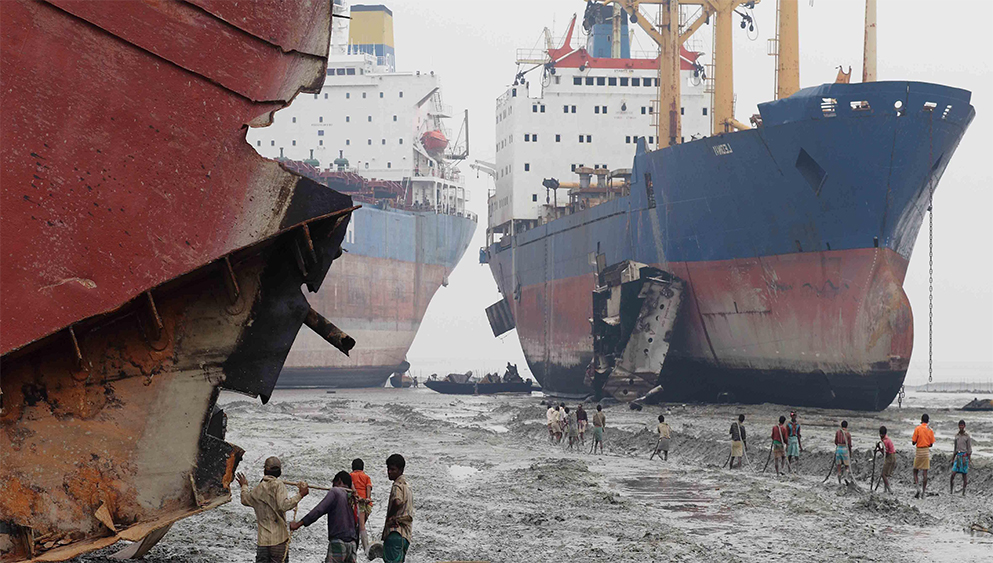The Dark Side of the Ship breaking Industry

Shipbreaking in South Asia: A Human Rights and Environmental Crisis
Introduction
With the evolution of international human rights norms, it is assumed that humanity has become more civilized and that slavery has ceased to exist. However, this assumption falters when we examine the fundamental rights of the unfortunate, downtrodden, and destitute ship breakers—laborers who earn less than £4 a day while contributing billions to national economies. Despite the lucrative nature of the shipbreaking business, the reality of low wages, hazardous conditions, and invisibility paints a grim picture.
The persistence of such exploitative labor practices highlights the limited impact of international human rights conventions on powerful state behavior. Although major ship recycling states—India, Pakistan, and Bangladesh—have ratified treaties like the International Covenant on Civil and Political Rights (ICCPR) and the International Covenant on Economic, Social and Cultural Rights (ICESCR), they continue to ignore their obligations to protect the right to life (Article 6, ICCPR) and the right to health (Article 12, ICESCR).
According to political theorist Kenneth Waltz, states often ratify human rights treaties not out of genuine commitment, but under pressure from more powerful nations. This observation aligns with the behavior of South Asian states, where adherence to human rights is compromised by economic expediency.
The Reality of Shipbreaking: Dangerous Work and Disposable Lives
Shipbreaking is universally acknowledged as a high-risk job. Workers face:
Deadly toxins
Exploding gas chambers
Falling steel plates
Chronic diseases such as asbestosis and cancer
For example, on November 1, 2016, a fire on a ship at Gadani, Pakistan, killed 28 workers. The blast occurred because laborers were forced to begin dismantling before cleaning the fuel tanks—an avoidable tragedy.
Despite such incidents, safety improvements remain elusive. Workers often lack Personal Protective Equipment (PPE) such as helmets, safety shoes, or goggles. Respiratory gear is rarely provided, and in some cases, laborers go barefoot.
Moreover, 98% of shipyard workers are illiterate. There are no employment contracts, no ID cards, and thus no accountability when injuries or deaths occur. Workers have no access to medical care, no sick leave, and no formal grievance mechanisms. In case of injury, no compensation or retraining is offered—plunging families deeper into poverty.
Structural Deficiencies and Global Shifts in the Industry
A 2010 World Bank report stated:
“Although the industry is beneficial from a life-cycle assessment point of view, over the years it has gravitated toward countries with low labor costs, weak regulations on occupational safety, and limited environmental enforcement.”
This “global shift” has made South Asia the epicenter of the shipbreaking industry, driven by profit maximization and regulatory avoidance.
South Asia: The Dumping Ground for Obsolete Vessels
Countries such as India, Bangladesh, and Pakistan have become the world’s largest shipbreaking hubs, particularly in:
Chittagong, Bangladesh
Alang, India
Gadani, Pakistan
Ship owners avoid modern recycling facilities in Europe and North America—where health, safety, and environmental regulations are stringent—in favor of cheaper, under-regulated beaches in South Asia. According to NGO Shipbreaking Platform, in 2017 alone:
543 ships were dismantled in South Asia
Majority through the hazardous beaching method
Beaching Method: An Outlawed Practice in the West
The beaching method involves running a vessel aground and dismantling it during low tide. This is:
Banned in the EU
Harmful to workers and marine ecosystems
Lacking proper waste containment
Year-wise Beached Ships in South Asia (NGO Shipbreaking Platform):
| Year | Ships Beached |
|---|---|
| 2012 | 850 |
| 2013 | 645 |
| 2014 | 641 |
| 2015 | 469 |
| 2016 | 668 |
| 2017 | 543 |
Ships contain hazardous materials including asbestos, lead, PCBs, oil residues, and heavy metals—much of which ends up in local markets or unregulated dumps, with long-term ecological and public health consequences.
International Legal Framework: Inadequacies and Gaps
Basel Convention & IMO Guidelines
While existing frameworks like the Basel Convention and IMO ship recycling guidelines aim to address the issue, they are widely viewed as insufficient due to:
Lack of enforcement
No clear accountability
Minimal oversight
Hong Kong International Convention (HKC), 2009
Adopted by the International Maritime Organization (IMO) in May 2009, the Hong Kong Convention was a significant attempt to address environmental and labor concerns in shipbreaking. However, it has not yet entered into force, and several limitations raise serious concerns:
Key Drawbacks of HKC:
Does not ban the beaching method, despite its risks.
Fails to mandate pre-cleaning of hazardous materials before arrival.
Excludes warships and government-owned vessels.
Overly reliant on certification and documentation, rather than on-ground enforcement.
No clear assignment of responsibility in case of accidents or explosions.
Fails to criminalize illegal traffic in toxic ships.
Environmental groups have called it a “legal shipwreck”, asserting it lacks the enforcement teeth to compel real reform.
Conclusion: Modern Slavery in Plain Sight
Shipbreaking in South Asia is a modern form of slavery. The failure of India, Pakistan, and Bangladesh to uphold international human rights law and environmental standards is a glaring indictment of state inaction. While the Hong Kong Convention is a step in the right direction, it does not sufficiently address the systemic exploitation or the environmental devastation caused by the shipbreaking industry.
Real change requires binding legal enforcement, state accountability, and global cooperation to protect labor rights and the environment. Until then, thousands of ship breakers will continue to risk—and lose—their lives for profits they will never see.
Way Forward: Recommendations
Industrial Platforms over Beaches: Shift shipbreaking activities from tidal beaches to regulated industrial platforms with proper waste containment.
Adopt Dry Dock Recycling: Encourage the use of dry dock methods used in Europe and the U.S., which are safer for workers and the environment.
Voluntary Codes of Conduct: Until HKC is ratified, ship owners must adhere to responsible recycling policies and avoid substandard yards.
Labor Rights Enforcement:
Enforce labor laws
Ensure social security and pensions
Facilitate the right to unionize
Workplace Safety: Mandate the use of PPE, safety training, and emergency response mechanisms.
HKC Ratification Support:
Provide financial and technical assistance to help Pakistan and Bangladesh upgrade facilities.
Encourage India to lead by example, given its progress toward ratification.
